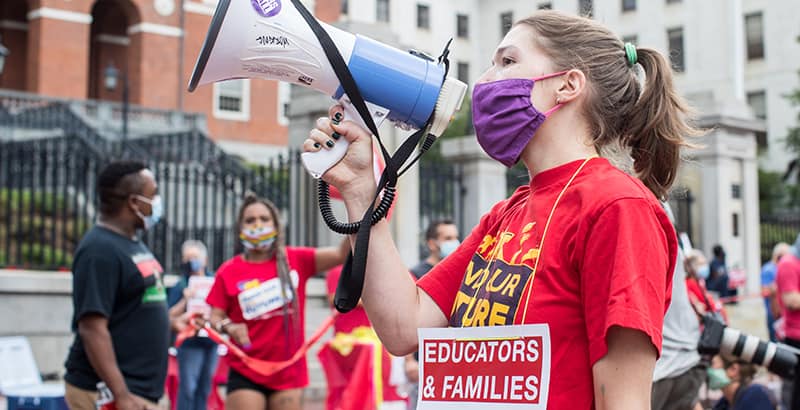
Travis Lavenski is a student at Harvard Law School.
In today’s news & commentary, Apple executives face Labor Board complaint; public school teachers in Woburn, Massachusetts are on strike for the second straight school day; UAW Presidential runoff election voting begins this week; and a recent Jacobin article discusses an app that could facilitate union organizing.
Prosecutors at the Labor Board say that executives at Apple may have violated that NLRA, Bloomberg reports. At issue is a 2021 all-staff email sent from CEO Tim Cook threatening to punish leakers and containing employee handbook policies pertaining to proscribed employee communications with those outside the company. The emails came after media reports regarding a company-wide meeting whose topics included hot button political issues such as the Texas anti-abortion bill and pay equity. The NLRB General Counsel’s office has stated their belief that Apple’s work rules and statements “tend to interfere with, restrain or coerce” Apple workers from exercising their collective action rights granted by the Labor Act. Board spokesperson Kayla Blado has stated that the Board’s regional director will issue a complaint unless the company settles.
Over 550 public school teachers are on strike in Woburn, Massachusetts today, cancelling classes for the second straight day. The teachers are striking to demand increased pay for paraprofessionals, smaller class sizes, physical education classes for elementary school students, among other things. The teachers unsuccessfully negotiated 25 times with the City before deciding to strike. Negotiations occurred yesterday during the first day of strike action, but stalled after 8-hours of talks. Currently, public teachers are forbidden to strike under Massachusetts law, leading the City to seek an injunction against the strike. A ruling against the teachers could either end the strike or lead to large fines. However, successful Massachusetts teacher strike actions in Brookline and Malden have recently proceeded the Woburn teachers strike.
Members of the United Autoworkers union began voting for the presidential runoff election Monday. After none of the five initial candidates captured a majority during the December 2022 Presidential vote, two candidates moved forward for a runoff election: the incumbent President Ray Curry and reformer-candidate Shawn Fain. The election will also determine a vice president and a regional director. This marks the first UAW officer election in the union’s history following a corruption scandal which led to the imprisonment of over a dozen former officials, including two former UAW Presidents, and nearly led to the UAW’s expulsion from the AFL-CIO. Fain, who has criticized Curry for not taking an aggressive enough approach in negotiating auto contracts, has a slight edge over the incumbent President in the run-off. Currently, 6 of the 14 UAW officer positions are held by reform candidates. Reformers could hold an outright majority after the runoff election is finished. Ballots for the runoff election are due February 28th.
In a recent Jacobin article, political commentator and writer Davis Moscrop discusses the new app “YouIn?,” an app whose goal is to “make unionization more accessible to the younger generation in the ongoing fight for higher wages, benefits, pensions, safer working conditions, and an end to unfair workplace discrimination,” according to its founder. The app is designed to anonymously facilitate unionizing by allowing a worker to send an anonymous email to their coworkers to invite their coworkers to join a union. If enough workers respond to the email supporting a union, the app automatically sends digital certification cards to the workers, which are then signed and sent directly to the union the workers choose to represent them. The app is primarily targeted towards jurisdictions in countries with card check laws such as British Columbia, Canada, where it has partnered with several unions. The app could still find use in non-card check jurisdictions as well, however, by adding a layer of anonymity for the worker who initially tests support for organizing in their workplace. The article approaches the app with a healthy amount of skepticism, cautioning against “driv[ing] [the unionization process] underground any more than it must be,” but notes that the app could at least find use as a tool to “get the process started, or test the waters, particularly in spaces where employees are worried about retaliation from bosses.”






Daily News & Commentary
Start your day with our roundup of the latest labor developments. See all
December 22
Worker-friendly legislation enacted in New York; UW Professor wins free speech case; Trucking company ordered to pay $23 million to Teamsters.
December 21
Argentine unions march against labor law reform; WNBA players vote to authorize a strike; and the NLRB prepares to clear its backlog.
December 19
Labor law professors file an amici curiae and the NLRB regains quorum.
December 18
New Jersey adopts disparate impact rules; Teamsters oppose railroad merger; court pauses more shutdown layoffs.
December 17
The TSA suspends a labor union representing 47,000 officers for a second time; the Trump administration seeks to recruit over 1,000 artificial intelligence experts to the federal workforce; and the New York Times reports on the tumultuous changes that U.S. labor relations has seen over the past year.
December 16
Second Circuit affirms dismissal of former collegiate athletes’ antitrust suit; UPS will invest $120 million in truck-unloading robots; Sharon Block argues there are reasons for optimism about labor’s future.